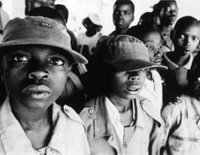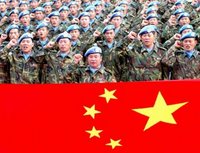 ...is had by the average canine. During my recent trip to DR Congo, many of the former child soldiers I met--dogs of war in their own right--had caught whiff of certain unseemlies issuing from aid efforts designed to help them escape armed groups and reclaim their civilian childhood. By the time I met them, they had been disarmed, released and were on their way back to the village. Things were fairly rosy compared to their former lives as armed packmules and cannon fodder. Now naked without their guns, they were still a surly lot, clearly used to lording over anyone in their vicinity. Even without their weapons, their wolf-pack behavior continued. I watched the group dynamic as they banded together against an outsider or perceived threat. Alternately, when the coast was clear, they would snarl and turn on each other: teasing, abusing, dominating or being dominated. A de-militarized mind was still a long way off.
...is had by the average canine. During my recent trip to DR Congo, many of the former child soldiers I met--dogs of war in their own right--had caught whiff of certain unseemlies issuing from aid efforts designed to help them escape armed groups and reclaim their civilian childhood. By the time I met them, they had been disarmed, released and were on their way back to the village. Things were fairly rosy compared to their former lives as armed packmules and cannon fodder. Now naked without their guns, they were still a surly lot, clearly used to lording over anyone in their vicinity. Even without their weapons, their wolf-pack behavior continued. I watched the group dynamic as they banded together against an outsider or perceived threat. Alternately, when the coast was clear, they would snarl and turn on each other: teasing, abusing, dominating or being dominated. A de-militarized mind was still a long way off.In my interactions with them, we spoke not through a translator but in Lingala, which they seemed to enjoy. Once the initial raucous of my visit had subsided and the group became more reflective, often they would raise issues that surprised me with their prescience and directness. Indeed I heard one particular question repeated in nearly every 'transit center' or 'demobilization camp' I visited. It so happens that this issue is precisely that raised by a former World Bank economist in his recent book, The White Man's Burden.
Gaping holes and naked 'Big Men'
I was in the DRC to evaluate efforts to release and rehabilitate child soldiers over the last two years, efforts that cost the international community more than $20 million. By and large, the program has gone well with one glaring exception, a shortcoming not lost on the child soldiers I met--resulting in that uncanny sense of smell referred to above. Why did we westerners, they wanted to know, confide our foreign aid dollars to their politicians and administrators when everyone knew the money would never reach its intended destination? Why didn't foreigners manage the aid money directly, instead of giving it over to the government where it proved ineffective or simply evaporated?
[children in DRC demob camps]
 Programs to disarm, demobilize and reintegrate child soldiers (the DDR process) are more than a military and security measure in the post-conflict stabilization process of nations such as the DR Congo. More importantly, the programs serve to reconnect former child soldiers with their families and communities, to rehabilitate individual lives and to reweave the social fabric as positive foundations are laid for the future. To succeed, each of the three phases of child DDR must be executed in a timely and coordinated fashion. As in other African countries where large child DDR programs have been realized, the greatest obstacles to lasting achievements in the DRC lie beyond the scope of the implementing agencies themselves. These obstacles include ongoing conflict and political uncertainty, a deeply fractured socio-cultural sphere and a barren national economy. This scenario is further complicated by a thoroughly destroyed national infrastructure.
Programs to disarm, demobilize and reintegrate child soldiers (the DDR process) are more than a military and security measure in the post-conflict stabilization process of nations such as the DR Congo. More importantly, the programs serve to reconnect former child soldiers with their families and communities, to rehabilitate individual lives and to reweave the social fabric as positive foundations are laid for the future. To succeed, each of the three phases of child DDR must be executed in a timely and coordinated fashion. As in other African countries where large child DDR programs have been realized, the greatest obstacles to lasting achievements in the DRC lie beyond the scope of the implementing agencies themselves. These obstacles include ongoing conflict and political uncertainty, a deeply fractured socio-cultural sphere and a barren national economy. This scenario is further complicated by a thoroughly destroyed national infrastructure.Faced with the above challenges in all seven provinces of operation, the six aid agencies hired to implement the program have by and large managed to provide adequate care and support to children in transit between point of release and their home communities. The third and final phase of the process—projects aimed at the social and economic reintegration of the child within his or her home community—has yet to commence in earnest, due to operational delays and planning problems.[1] Providing a complete reintegration package to the remaining caseload of children before international financing dries up in June 2006 will be impossible. This is a failure, to be sure, but one that can be fixed with more money.
A more substantial failure --raised by the children themselves-- casts a long shadow over the whole process, and augurs poorly for international efforts to combine foreign aid programming with "nation-building" initiatives. In the DRC, the international community was funding child DDR programs (implemented by the usual heavy hitters: UNICEF, Save the Children, etc) while simultaneously funding the creation of a national ministry to supervise and coordinate the DDR process for all ex-combatants, a $200 million dollar venture.
Performance by this government ministry, the Commission Nationale de DDR, or CONADER, has been sub-standard. Lacking are a proactive analysis of available capacities and resources, an ability to anticipate and identify gaps and weaknesses in agency programming, and to harness the energies of disparate actors towards a common work plan, one that is subject to agreed performance indicators and criteria. Our team of evaluators found no evidence that CONADER is capable of performing the above tasks, nor did it demonstrate a willingness to learn from other qualified actors (UNICEF, specifically) in order to perform optimally. This was the gaping hole in the national DDR program for children, the emperor without clothes, for which the children themselves were demanding an explanation.
Such incapacity is the inevitable result when any government ministry, Congolese or American, is run by a cherry-picked network of 'friends of friends' whose opaque selection criteria boil down to tribal connections and clientelism. It is this form of corruption that is destroying Congolese hopes for a true meritocracy in the post-war public and private sectors. None of the CONADER staff I met had the faintest idea how to conduct so huge an operation (DDR for adults and children combined) with the appropriate planning, administrative systems and structures of accountability. Yet they were given their jobs anyway, because they were 'Big Men' and had the right connections.
Why work with mental invalids and common crooks?
"Because we have to," comes the honest answer. We live in a post-colonial world. The international community must deal with developing countries, even countries like Somalia without recognized governments, as sovereign nations. USAID or the World Bank does not hire and fire national ministers in the Congo. Also, the foreign aid business is not the private sector. We can't just 'cut our losses' and walk away from our investment, as multi-nationals commonly do. We can withold aid monies, or attach strings, but is this what emergency relief funding should be -- a carrot and stick for better governance? I dont think so, but I'm in the minority.
What upsets me is that national government structures created by the international community to deal with a given post conflict problem -- such as DDR and CONADER -- are held to a different professional standard than the international aid agencies funded to achieve specific results and who are subject to the standard regulatory norms.
This exceptionalism is wrong for lots of reasons. Primarily, it is a form of paternalism, in that we treat them like children (itself neo-colonial) when we dont hold them to the same standards as everyone else, ourselves foremost. Secondly, it amounts to complicity with the malaise of much African government: tribalism, clientelism and absence of meritocracy.
My answer to the child soldiers' question about money going to CONADER was this: they are your leaders, they are accountable to you alone, and you have national elections coming up in a matter of months. Are you going to continue to look to the outside world to solve your internal problems, and to blame the outside world when Congo remains a mess? What has that achieved, besides excluding you even further from responsibility for the country's woes? (Congolese love to blame their problems on outsiders, and I love to accuse them of avoiding any responsibility for their tragedy. We get along famously this way.)
A lot of silent floor-staring always followed these remarks. It seemed no one had any idea what I was talking about. In Congo, they told me, the hand that gives is always above the hand that receives--this will never change. Translation: democratic elections are a charade. Money talks, bullshit walks, and so goes the country. He who makes the gold makes the rules. Our leaders will never listen to us, only to you, the international community, as long as you continue to hold the purse strings.
Let's lynch the landlord!
A recent book from William Easterly, The White Man’s Burden, addresses this problem from a similar angle. Easterly is the former World Bank economist who jumped ship (landing unscathed in an Ivory Tower – NYU) after publishing his 2001 assault, The Elusive Quest for Growth, on the folly of western institutions trying to jump-start economic growth in the developing world. Africa is the primary exhibit in the litany of failures that follows.
My first reaction was the brain thud of 'how typical': all too often the bashers of foreign aid use 'hopeless Africa' as their sole piece of evidence. What about all the foreign aid that has helped other parts of the globe? For instance, World Bank economists consider India and China to be two of the greatest foreign aid success stories. What of the Vietnams or Chiles (both socialist, but still helped considerably by a largely non-ideological World Bank), or other success stories of foreign aid?
I'm not particularly partial to the Bank. It's just that a more truthful book would not bash (exclusively) the West's efforts to help people in hell, but would document the reasons why those people are in hell in the first place. Congolese child soldiers were not denying the fact that the primary problem lay with their political class; they just wanted international donors to carry a bigger stick. But international donors are not in the business of busting kneecaps or playing global cop. Alas, that would be too easy, and I often wish they would. But to blame Darfur or the human tragedy of Congo on the international community (donors, the UN, aid agencies, etc.) only adds to the obfuscation while fomenting a dubious rationale for isolationism and disengagement.[2]
[Chinese peacekeepers heading
to the DRC]
 Unsurprisingly, perhaps, the country making the greatest inroads into African economic development and resource extraction, the People's Republic of China, does not consider itself a member of the 'international community' regarding African affairs. 'Bullied and manipulated' by the West, China sees in Africa a trading partner and fellow developing country. [see report]. Unlike the West, it attaches no strings or conditions regarding 'good
Unsurprisingly, perhaps, the country making the greatest inroads into African economic development and resource extraction, the People's Republic of China, does not consider itself a member of the 'international community' regarding African affairs. 'Bullied and manipulated' by the West, China sees in Africa a trading partner and fellow developing country. [see report]. Unlike the West, it attaches no strings or conditions regarding 'goodgovernance' or democratic reform to its bilateral assistance. No doubt this is an attractive alternative for African governments, but one of some consteration to the western aid community, who recognize its potential to take the bite out of Western efforts to democratize and bring accountability to African governments -- the 'nation-building' experiment of CONADER criticized above.
So what did I recommend should be done about CONADER in my report to donors? The impossible: burn the house down and hire some serious candidates. It may never happen, but at least it made some people squirm uncomfortably in the board room.
[1] To wit, 9749 children are reported as presently engaged in social and economic reintegration activities, only 42% of those demobilized and reunified thus far (or 22% of the overall number of 43,903 to benefit from the child DDR program).
[2] For the record, while I'm venting, Congo's tragedy is not the fault of the World Bank, the Rwandans, the US, or even colonialism. Wherever there are victims, people automatically start to fantasize about the cause and effect of some limitless power. The more humble reality, as Iraq shows flawlessly, is that no foreign institution or occupying force or colonial era is so powerful as to condemn an entire country to purgatory for the last 40 years.